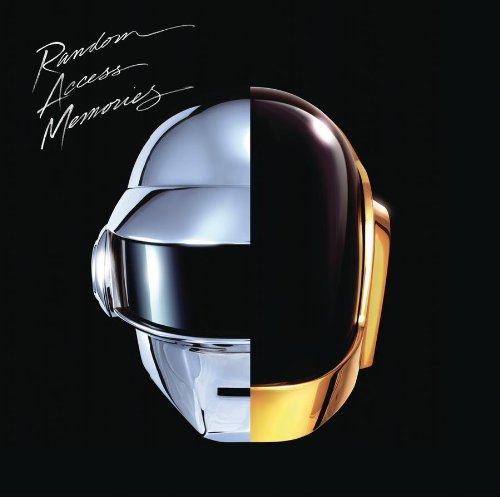Label - Columbia
Release Date - Out Now
To say the latest long-player from everyone's favourite Gallic robot duo was eagerly anticipated would perhaps be understatement of the century. From the teaser trailer that appeared, offering just a snippet of lead single 'Get Lucky', to the trailer aired at the Coachella Festival, to the slow reveal of guest collaborators on board (an eclectic crew including electro pioneer Giorgio Moroder, The Strokes vocalist Julian Casablancas, N.E.R.D. man Pharrell Williams, Chic disco legend Nile Rodgers and more) it was like each tidbit of information was pounced on by those with an ear for good music.
Of course, 'Get Lucky' was the first track that got exposure, and it's sunny, laid-back funk was a surefire hit in waiting for the summer (however terrible it may prove to be on our shores!). The rest of the album ain't bad either, as it goes. For their first effort since 2005's moderately well received 'Human After All', Thomas Bangalter and Guy Manuel de Homem-Christo show us that, after giving us a techno and house blitzkreig (1996's debut 'Homework'), a sublime mixture of chilled out grooves and pop-friendly dance ('Discovery' from 2001), and a slickly produced soundtrack album for the 'Tron: Legacy' movie (that introduced the duo to working with orchestral performers) they perhaps are human after all. It's certainly Punk's most organic sounding album, with lashings of disco guitar, natural vocals (there is a fair slice of filtered and synthesised vocals on offer) and more orchestral work.
'Give Life Back to Music' shares 'Get Lucky's summery dance vibe, without being overly electronic. It sounds at once just like Daft Punk and yet not like anything they've recorded before. The slower paced 'Game of Love' evokes the image of a robot far from home, singing a lament to how things used to be when he was loved and admired. The first major guest star pops up on the appropriately titled 'Giorgio by Moroder', where Daft Punk craft a synth-monster that Moroder himself would be jealous of, as he provides interview style soundbites about his life and career over the top. It never feels like it's outstaying it's 9min running time, and builds to a fantastic crescendo of electro bliss.
'Within' - another plaintive, piano-led track sung in the trademark synthesized voice Daft Punk are synonymous with, is a beautiful and emotive piece, which shares it's roots with work last seen on 'Discovery'. Julian Casablancas' guest spot on 'Instant Crush' is another sleeper track, which at first may seem lightweight and throwaway, but there's a definite Strokes vibe going on here, except with less indie-rock guitar. Casablancas' vocals are also vocodered, and once you get over the fact it doesn't really sound like him, it gives the track a context to work in.
Pharrell, while popping up on the lead single, also lends his vocals to 'Lose Yourself To Dance' a funky, rhythmic piece that is probably a grower for those fans used to the more upbeat of Daft Punk's back catalogue, but will eventually make your toes tap and your head bounce to it's irresistible melody.
'Touch', a collaboration with renowned singer/songwriter Paul Williams (no relation to Pharrell), should, on paper at least, sound like a complete mess. Eight minutes of swirling, ominous overtures, a sad sounding intro, Barry Manilow style pomp and campness (really), a synth-entwined piano breakdown with the refrain of "if love is the answer...hold on", before an extended outro that manages to sound like the end credits to the best film never made. And rather than being a mess, it's a complete triumph - although Christ knows how they'll play it live.
Where the album perhaps fares less than nuclear on the excitement scale is on the latter half of the disc, with tracks like 'Beyond', which relies a little too much on the melody and style of tracks that came before it, and isn't that essential, and 'Doin' It Right' (featuring Panda Bear) which again, is a little too repetitive in nature. 'Fragments of Time' harks back to the summertime feel showcased by a lot of the material on 'R.A.M.' and is the closest thing to a title track, with it's lyrics referring to memories and experiences in a life well lived. And so, to the final curtain, with 'Contact'. With it's samples of a NASA Apollo mission, explosive instrumental refrain and coda with an urgent, screeching build-up, and an ending where the melody literally breaks up into bursts of static and finally sounds like it's exhausted itself before crashing out in a wave of sound, it's the song that leads you on a journey through space. It really is among one of the best pieces of work they've ever committed to tape.
Overall, this is definitely an album that does beat the hype that's been created. It's refreshing to see a band deliver something truly epic and, as if they've not done it enough already, break new ground in terms of what two men and a bunch of electronic instruments can do. It seems adding a more human feel to their sound really has breathed new life into their repertoire.
Rating 5/5

